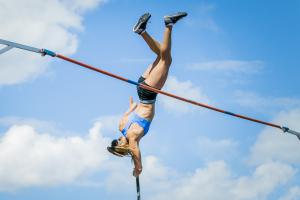Get to Know Vertigo: The Most Common Sign of Concussion
Neurologist Harry Kerasidis, M.D. Lectures “The Eyes and Ears of Concussion” at the Mid-Atlantic Athletic Trainers’ Association Annual Symposium, May 19-21
“Most people will refer to the feeling as ‘dizzy,’” said Dr. Kerasidis, medical director at the Center for Neuroscience at Calvert Memorial Hospital in Maryland, as well as Founder of XLNTbrain. “But we all need to get to know vertigo, because it’s much more than a dizzy feeling, particularly as related to the sports concussion management protocols.”
The 90-minute lecture will provide certified education units for members of MAATA, which represents athletic trainers in Delaware, Washington D.C., Maryland, New Jersey, New York, Pennsylvania, Virginia, and West Virginia.
According to Dr. Kerasidis, 55% of people with sport-related concussions complain of “dizziness,” which is more common than headaches, loss of consciousness or memory loss.
“Unfortunately, about one-third of all concussed athletes complain of persistent dizziness lasting more than two weeks,” said Dr. Kerasidis who authored "Concussion-ology: Redefining Sports Concussion Management." “Vertigo involves several areas of the neuroanatomy structures that affect balance, hand-eye coordination, and visual interpretation. It’s more serious than it gets credit for.”
Dr. Kerasidis will discuss various vertigo detection and assessment methods, and treatment options, including compliance with the latest standards in concussion care according to the NCAA and the recent International Consensus statement on concussion in sport (Berlin 2016).
More information about the MAATA Annual Symposium available here.
About the Speaker Neurologist Harry Kerasidis, M.D. and co-founder of XLNTbrain Sport™, an online and mobile-based sports concussion system, has thousands of athletes, athletic trainers and medical personnel following his protocols for the return-to-play and return-to-learn medical clearance. Dr. Kerasidis also founded Chesapeake Neurology Associates, based in Prince Frederick, Maryland. Through this practice, he also treats other cognitive and behavioral disorders including memory loss, sleep deprivation, ADD, dementia, Alzheimer's, and traumatic brain injury. At Calvert Memorial Hospital, Dr. Kerasidis serves as the Medical Director for the Center for Neuroscience. His new book, “Concussion-ology: Redefining Sports Concussion Management” was published December 2015.
-end-
David Jahr
XLNTbrain Sport™
(949) 874-2667
email us here
Sport Concussions -- "Getting Your Bell Rung"
Legal Disclaimer:
EIN Presswire provides this news content "as is" without warranty of any kind. We do not accept any responsibility or liability for the accuracy, content, images, videos, licenses, completeness, legality, or reliability of the information contained in this article. If you have any complaints or copyright issues related to this article, kindly contact the author above.

